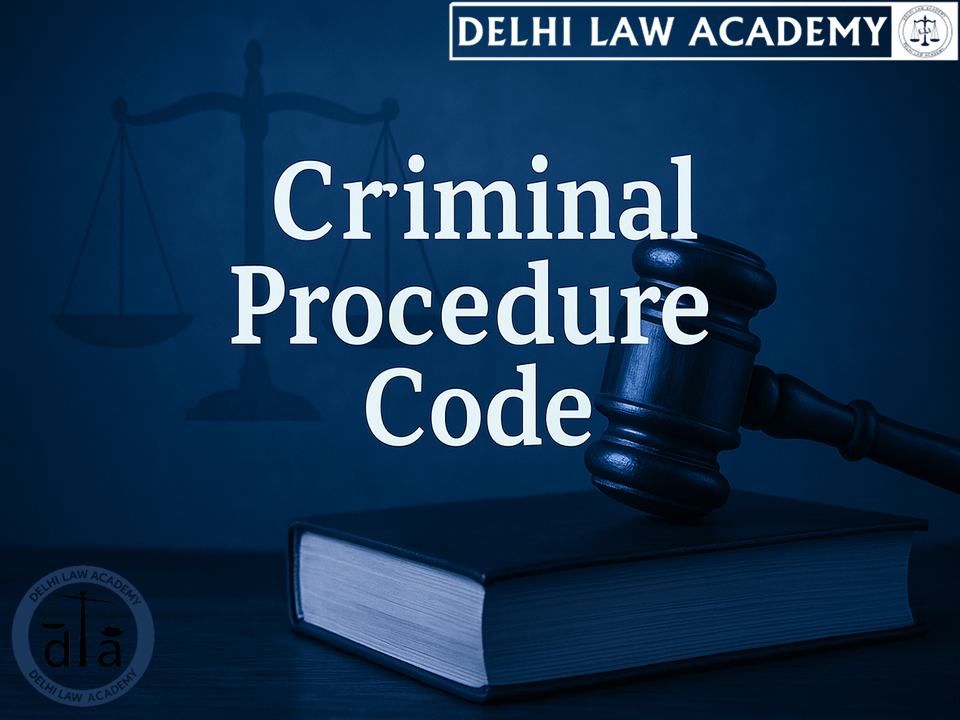
⚖️ CRIMINAL PROCEDURE CODE: BAIL IN NON-BAILABLE OFFENCES
TOPICS
- Bail in non-bailable cases
- Exception 1 to section 437(1)
- Exception 2 to section 437(1)
- Exception to both Exceptions
- Exception to Exception 2
- What is not a sufficient ground to refuse a bail?
Supreme Court in Gurcharan Singh v. State (Delhi Admn.) 1978 SC
• The principle underlying Section 437 is towards granting of bail except in cases where……….
📘 Preparation for RJS, DJS, PCS (J) and other Judicial Service exams
The Criminal Procedure Code forms the bedrock of any and every Judicial Service exam in the country. Its thorough knowledge is a must for all aspirants of RJS, DJS, PCS (J) and every other Judicial Service exam. To help such aspirants, DELHI LAW ACADEMY JAIPUR has launched a series of study material modules on all important aspects of this vital part of their syllabus:
⚖️ PROVISIONS OF BAIL AND BOND
Section 437 — Bail in non-bailable cases
- When any person accused of or suspected of commission of a non-bailable offence
is arrested or detained without warrant by an officer-in-charge of a police station or appears or is brought before a Court other than a High Court or Court of session, he may be released on bail…
🚫 Exception 1 to section 437(1)
- Such person shall not be so released if there are reasonable grounds for believing that he has been guilty of an offence punishable with death or imprisonment for life…
⚠️ Exception 2 to section 437(1)
- Such person shall not be so released if such offence is a cognizable offence and he had been previously convicted of an offence punishable with death or imprisonment for seven years or more, or had been previously convicted on two or more occasions of a cognizable offence punishable with imprisonment for 3 years or more but not less than 7 years.
👩 Exception to both exceptions
- Court may direct that a person in clauses (i) and (ii) be released on bail if such person is under sixteen years of age or is a woman or is sick or infirm.
⚖️ Exception to exception 2
- Court may also direct that a person under clause (ii) be released on bail if it is just and proper so to do for any other special reason.
🚷 What is not a sufficient ground to refuse bail?
- The mere fact that the accused may be required for being identified by witnesses during investigation shall not be sufficient ground for refusing to grant bail if he is otherwise entitled to be released on bail and gives an undertaking that he shall comply with directions of the Court.
🏛️ Supreme Court on Section 437 — Gurcharan Singh v. State (Delhi Admn.) 1978 SC
- Section 437 Cr.P.C. provides as to when bail may be taken in case of non-bailable offences.
- Sub-section (1) makes a dichotomy in dealing with non-bailable offences.
- The first category relates to offences punishable with death or imprisonment for life and the rest are all other non-bailable offences.
- With regard to the first category, Section 437(1) imposes a bar to grant of bail to a person accused or suspected of an offence punishable with death or imprisonment for life, if there appear reasonable grounds for believing that he has been so guilty.
- Therefore, at the stage of investigation, there is no ban against granting of bail unless there are materials to justify belief that the person is guilty of such an offence.
- In all other non-bailable cases, judicial discretion will always be exercised by the Court in favour of granting bail subject to Section 437(3).
- The Courts oversee the action of the police and exercise judicial discretion in granting bail, balancing individual liberty and the cause of justice.
- The principle underlying Section 437 is towards granting of bail except in cases where there appear reasonable grounds for believing guilt of offences punishable with death or life imprisonment.
- The language of Section 437(1) may be contrasted with Section 437(7):
“if there appear to be reasonable grounds for believing that he has been guilty” vs.
“that there are reasonable grounds for believing that the accused is not guilty of such an offence.” - This difference arises due to the stage at which each sub-section operates — at arrest vs. at trial.
- At investigation, if materials indicate guilt, the Court must commit the person to custody.
- At that stage, the Court is concerned with the existence of materials against the accused, not their credibility on merits.
- Unless exceptional circumstances exist, the Court will not deny bail to a person not accused of an offence punishable with death or life imprisonment.
- When accused of such serious offences, bail can only be granted in extraordinary cases under the proviso to Section 437(1).
What is required is not accusation or suspicion but reasonable grounds for believing that he has been guilty.
A Magistrate must hold that there are such reasonable grounds before refusing bail.
💬 FAQs — Bail in Non-Bailable Offences (CrPC §437)
- Exception 1: Bail shall not be granted if there are reasonable grounds for believing the accused is guilty of an offence punishable with death or imprisonment for life.
- Exception 2: Bail shall not be granted if the offence is cognizable and the accused has prior convictions of specified gravity (e.g. previously convicted of an offence punishable with ≥7 years or convicted on two or more occasions of cognizable offences punishable with 3+ years).
🔹 Delhi Law Academy Jaipur — CrPC notes for RJS | DJS | PCS(J)
📘 Free Study Material for Judiciary Aspirants!
Download our FREE study material prepared by Delhi Law Academy’s expert faculty.
Contact us
📍 Delhi Law Academy – Jaipur Branch
6C, Tower 2, Coaching Hub, Pratap Nagar, Jaipur – 302033
📞 Phone:
+91 9911916552
+91 8447285606
✉️ Email:
contactus@delhilawacademy.com

